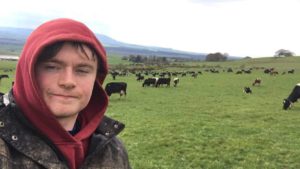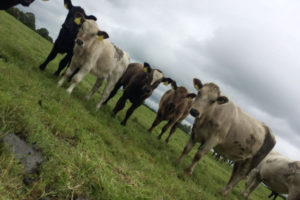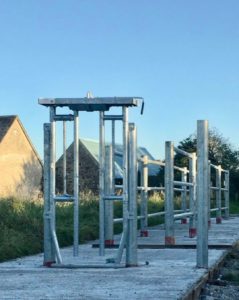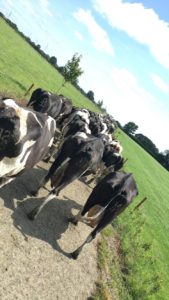As part of this week’s Student Focus, That’s Farming speak to Stefan Maher, a suckler farmer and final-year student at WIT.
Growing up near a rural village between Templemore and Thurles, Stefan Maher and his family have a strong farming tradition association, spanning several generations.
The Tipperary native has been passionate about agriculture from his early childhood and is pursuing his studies in this field.
“As a youngster, I was always out with my dad checking cattle and sitting up in the tractor whilst spreading fertiliser and drawing in bales. From the age of three, I’ve been attending the National Ploughing Championships, and have never missed one until 2020, as it was cancelled,” Stefan Maher told That’s Farming.

45-cow suckler/beef enterprise
The 22-year-old student and his father run a 45-cow suckler/beef enterprise, consisting mainly of Charolais, Herefords, and Simmentals. His father works full-time off-farm and Stefan assists when available.
“We calve in the month of April as the herd is out on grass and the workload is greatly reduced. Also, we have not enough housing for calving down. It works well for us as we use an easy calving Angus bull, so we have very few difficult calvings.”
“The majority of our farmland is a mile from the home yard. I recently built a new crush located in the centre of this block of land. For the calving season, we graze paddocks closest to this crush.” the suckler farmer explained.

“I plan to construct a number of pens around the crush, which will make it easier to handle and assist any hard calvings in the future. We plan to introduce a Charolais bull.”
The duo sells 50% of yearling bullocks in Templemore Mart and fatten the remaining bullocks and slaughter these at 22 months in Meadow Meats Rathdowney. Furthermore, they retain all heifer calves as replacements.

Education
Stefan is in his final year at the Waterford Institute of Technology. He studied a BSc in Agriculture for three years and is now completing a BSc (Hons) in Land Management in Agriculture.
“I always knew I wanted to pursue a career in agriculture which made it easier to select a course. Through a good bit of research into many agricultural courses, I thought this one was best suited to me, due to its wide range of practical modules.”
Stefan completed a 12-week work placement in year two of his degree programme. The 1000-acre farm consisted of a 750-cow Jersey-cross-Friesian herd on a grazing platform of 800 acres.
“I went to a dairy farm in southwest Scotland, overlooking the town of Dumfries… I could not have met a nicer family.”
“Calving commenced three weeks into the placement, so I had plenty of time to get familiar with the workings of the farm. I was given a lot of responsibility in the day-to-day management of the herd.”
“Such tasks included bringing in each group of cows to be milked, choosing which paddocks to graze next by following the grass wedge, weekly grass measures and feeding dry cows, as well as milking and calving. There were plenty of workers on the farm so there was never any pressure placed on me.”

Future
To conclude, the suckler farmer is considering travelling for a period, possibly to Australia or New Zealand, when he completes his studies, if circumstances allow.
“I have second cousins living in New Zealand, so it would be nice to meet them as well. But with Covid-19, travel may not be an option. If not, I would hope to get a job in the agricultural sector after college, possibly in the area of advisory or soil nutrition.”
Stefan’s main goal is to work in industry before considering converting to dairy on the home farm.
“My ultimate goal would be to obtain a well-paid job for maybe eight years. Then, if things are still looking good in the dairy sector, I would like to convert the farm to dairy, maybe install a robot and keep a job going part-time, if possible.”
Interview conducted by Catherina Cunnane
To share to your story, email – [email protected]





